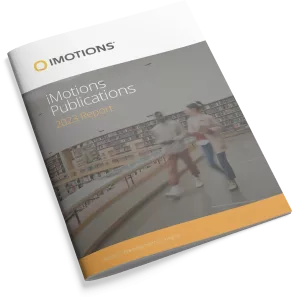-
Eye-Tracking the City: Matching the Design of Streetscapes in High-Rise Environments with Users’ Visual Experiences
Abstract Large cities in the West respond to an ever-increasing shortage of affordable housing by accelerating the process of urban densification. Amsterdam, for instance, aims to increase its housing stock by 10 percent in the next 15 years as its population is expected to grow by 20 percent. As in other cities, it seems inevitable […]
-
I Can See It in Your Face. Affective Valuation of Exercise in More or Less Physically Active Individuals
Abstract: The purpose of this study was to illustrate that people’s affective valuation of exercise can be identified in their faces. The study was conducted with a software for automatic facial expression analysis and it involved testing the hypothesis that positive or negative affective valuation occurs spontaneously when people are reminded of exercise. We created […]
-
The Impact of Contextualized Emotions on Self-Regulated Learning and Scientific Reasoning during Learning with a Game-Based Learning Environment
Abstract: The goal of this study was to examine college students’ (n = 61) contextualized emotions during in-game actions while playing CRYSTAL ISLAND, a game-based learning environment where students are tasked with solving the mystery of what illness impacted all island inhabitants. We examined emotions during in-game actions: during book reading, after scanning food items for the […]
-
The agency effect: The impact of student agency on learning, emotions, and problem-solving behaviors in a game-based learning environment
Abstract: Game-based learning environments are designed to foster high levels of student engagement and motivation during learning of complex topics. Game-based learning environments allow students freedom to navigate a space to interact with game elements that foster learning, i.e., agency. Agency has been studied in learning, and it has been demonstrated that increased student agency […]
-
Sadder but wiser: Emotional reactions and wisdom in a simulated suicide intervention
Abstract: Scholars within the Berlin paradigm have analysed participants’ responses to a hypothetical vignette about a friend’s suicide ideation. However, no study has yet focused on participants’ emotional reactions to this scenario, an important aspect of wisdom performance. We conducted a Thin‐Slice Wisdom study where participants were asked to give advice to a hypothetical friend contemplating […]
-
Emotion recognition from posed and spontaneous dynamic expressions: Human observers vs. machine analysis
Abstract: The majority of research on the judgment of emotion from facial expressions has focused on deliberately posed displays, often sampled from single stimulus sets. Herein, we investigate emotion recognition from posed and spontaneous expressions, comparing classification performance between humans and machine in a cross-corpora investigation. For this, dynamic facial stimuli portraying the six basic […]
-
Investigating the detection of emotion concealment using the Gazepoint GP3 eye-tracker
Abstract: In the investigative field, the use of interviews as a method of gathering legally admissible information is in serious decline. Due to a greater understanding of human stress response and biometric measurements, previously objective tools such as the polygraph have been removed from the investigators toolkit. Newer methods of biometric monitoring can potentially help […]
-
Modeling emotion in complex stories: the Stanford Emotional Narratives Dataset
Abstract: Human emotions unfold over time, and more affective computing research has to prioritize capturing this crucial component of real-world affect. Modeling dynamic emotional stimuli requires solving the twin challenges of time-series modeling and of collecting high-quality time-series datasets. We begin by assessing the state-of-the-art in time-series emotion recognition, and we review contemporary time-series approaches […]
-
Rhetorical strategies and emotions in political marketing management
Abstract: Purpose The purpose of this paper is to analyze how political marketing management in terms of communication practices influence the voters’ emotional responses as they observe and listen to the discourse of a political leader. Design/methodology/approach An experiment was conducted, in which participants watched the last debate of the campaign leading up the Peruvian […]
-
Factorized Multimodal Transformer For Multimodal Sequential Learning
Abstract: The complex world around us is inherently multimodal and sequential (continuous). Information is scattered across different modalities and requires multiple continuous sensors to be captured. As machine learning leaps towards better generalization to real world, multimodal sequential learning becomes a fundamental research area. Arguably, modeling arbitrarily distributed spatio-temporal dynamics within and across modalities is […]
Research Report 2024
In-depth look at the scientific landscape as powered by iMotions software, showcasing groundbreaking research and the impact of our tools in various scientific and industrial fields.
iMotions Science Resources
Looking for white papers, validation reports or research show casing iMotions Multimodal capabilities?
Share Your Research

850+ universities worldwide with an iMotions human behavior lab
73 of the top 100 highest ranked universities
710+ published research papers using iMotions
iMotions is used for some of the most interesting human behavior research studies carried out by top researchers around the world. Contact us to have your publication featured here.
The authors of these publications have used iMotions as a software tool within their research.
“Software should be cited on the same basis as any other research product such as a paper or a book; that is, authors should cite the appropriate set of software products just as they cite the appropriate set of papers” (Katz et al., 2020).
We therefore encourage you to cite the use of iMotions where appropriate.
How to cite iMotions
APA
iMotions (10), iMotions A/S, Copenhagen, Denmark, (2024).
Note: adjust the version and year where relevant.
5 Most Popular Blogs
Learn How to Conduct Human Behavior Research with iMotions
Publications
Read publications made possible with iMotions
Blog
Get inspired and learn more from our expert content writers
Newsletter
A monthly close up of latest product and research news



